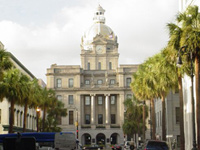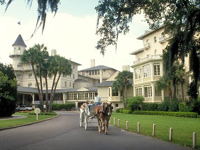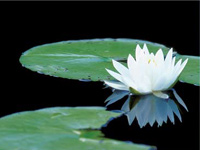What
do you think of when you hear Georgia mentioned? Peaches.
Atlanta. Braves. Coast? There is just over one hundred
miles of Georgia coastline and every inch of it is packed
with the good stuff. Beaches. History. Wildlife. Island
resorts. Lighthouses. All in all, a great place to do
some roaming.
Two
highways parallel the Georgia coast — Interstate 95,
for the traveler in a hurry to get from one location
to another, and US Highway 17, a less-traveled byway
that zigzags through the history of the region. It also
zigzags across I-95 four times along those one hundred
miles. So it does not matter whether you travel from
the north or south, or if you start in the middle, the
important thing is to arrive and enjoy this special
place, the Georgia Coast.
Take it from the top — Savannah
 |
|
Savannah's
City Hall
|
You
know you are entering Georgia when you cross the Savannah
River. What can sound more Southern than a river and
a city called Savannah? The best place to visit first
is the Historic District of Savannah, which has been
restored and preserved. Founded in 1733, the historic
district contains about two square miles of significant
buildings. Don't miss the "squares" scattered
throughout the district, park-like settings located
at many of the city's intersections. Each commemorates
an outstanding person or event in Savannah's history.
The city's founder, James Oglethorpe, laid the squares
out in his original plan for the city as social gathering
places and as central areas for fortifications. Large
oaks draped with Spanish moss line the historic district's
streets creating a picturesque atmosphere.
Savannah's waterfront is one of the most popular attractions in the city. It has restaurants, specialty shops, and arts and crafts galleries. The buildings along River Street were for years deteriorating cotton warehouses that in the late 1700s was the bustling economic center of Savannah.
The
Visitor Center is the restored 1860s Central Georgia
Railroad Station and now houses the Savannah History
Museum. From here make your plans for tours to the historic
district and the waterfront by one of the varied methods
— carriage, bus, or by car.
Tybee Island is located on the Atlantic Ocean about eighteen miles east of Savannah. One of many islands along Georgia's coast, it is one of the oldest resorts in Georgia. It's a pleasant seaside community with excellent beach access. The center point of Tybee Island is the famous lighthouse and the museum. Make plans to visit, but check the schedules — it is closed on Tuesdays.
Moving on down — Midway and Darien
To leave Savannah, both highways US 17 and I-16 (back to I-95) can be reached from M.L. King Boulevard near the Visitor Center. The town of Midway, just off I-95 and on Highway 17, is about thirty miles south of Savannah and about twenty-nine miles north of Darien, the next stop down I-95. A pleasant byway along I-95 is the Midway Church, Cemetery and Museum. The building was originally built in 1756 as a Puritan meetinghouse. During the Revolutionary War it was burned but was rebuilt in 1792.
Darien is one of most picturesque villages along the Georgia coast and is just east of the I-95 Exit 10 on US 17. Also located in McIntosh County is Sapelo Island, one of a string of barrier islands along the coast. Sapelo is managed by the Georgia Department of Natural Resources and can be toured by guided tram. The ferry to Sapelo Island only operates on Wednesdays and Saturdays, and part of the year on Fridays.
Brunswick and the Golden Isles
 |
Jekyll Island Historic District |
Brunswick is the gateway to the getaway barrier islands of Jekyll, St. Simons, and Little St. Simons. Little St. Simons is privately owned and accommodates a limited number of guests annually; it's noted for its serenity and undisturbed beauty. The Brunswick Marina is situated on a bay accessible to the Atlantic, host to plenty of shrimp boats, and a great photo opportunity.
Tours of the Jekyll Island Historic District are informative on the island's rich past and are conducted from trams, horse-drawn carriage or by foot. Jekyll Island was the residence of wealthy visitors who used the island for winter homes. Sunbathing, boating, tennis, horseback riding, and golf are among the favorite outdoor activities on Jekyll Island.
Historic Cumberland Island
The last exit on I-95 before leaving Georgia gives the opportunity to see the historic town of St. Mary's, Cumberland Island, Kingsland, and the Okefenokee Swamp. St. Mary's is the southeastern-most town in Georgia. Orange Hall, the Welcome Center and Museum, is it's centerpiece. Across the street from Orange Hall is the First Presbyterian Church, built in 1808, and is the second oldest church in Georgia. At the end of town is the waterfront where the Cumberland Island Ferry takes passengers to the barrier island which is the home of many free-roaming wild horses, and Plum Orchard, a 1898 mansion built by the Carnegie family. The Greyfield Inn, built in 1901 by the Carnegie's, is an operating inn in the spectacular setting of the barrier island.
The Last Stop — The Okefenokee Swamp
 |
Blooming Lotus in the
Okefenokee Swamp |
The Okefenokee Swamp is a landmark in southeastern Georgia. The swamp contains 438,000 acres, of which 396,000 make up the largest national wildlife refuge in the eastern U.S. The main East entrance to the Okefenokee Swamp is 11 miles southwest of Folkston. To get there from Kingsland, travel west on State Highway 40.
There are numerous activities available for visitors at the Okefenokee Swamp. Springtime is a favorite time for canoeing in the because the water levels are significantly higher. Boat tours into the swamp and a nine-mile-loop auto tour are popular and well worth the time.
Now what do you think when you hear mention of the Georgia coast? Beaches. Picturesque squares and River Street in Savannah, shrimp boats along Darien's harbor, the Golden Isles of Brunswick, wild horses of Cumberland Island, the Okefenokee Swamp. Picture-perfect and inviting in a way that only a southern state can be, the Georgia coast awaits.
For more information... |
Online information:
Visitors Centers:
Savannah Area CVB
101 East Bay Street
Savannah, GA 31401
912. 644.6401
1-877-SAVANNAH
McIntosh County Chamber of Commerce
P. O. Box 1497
Darien, GA 31305
(912) 437-6684
Brunswick & Golden Isles Visitor Bureau
4 Glynn Avenue
Brunswick, GA 31520
(800) 933-COAST
St. Mary's Convention and Visitor's Bureau
406 Osborne Street
St. Mary's, GA 31558
(800) 868-2199
Attractions:
Tybee Island Online
P.O. Box 2833
Tybee Island, GA 31328
info@tybeeisland.com
Tybee Island Lightstation
P.O. Box 366
Tybee Island, GA 31328
(912) 786-5801
Midway Museum
P.O. Box 195
Midway, GA 31320
(912) 884-5837
Waycross Tourism and Visitor Center
(Okefenokee Swamp Park)
315-A Plant Avenue
Waycross, GA 31501
(912) 283-3744
Okefenokee National Wildlife Refuge
Route 2, Box 3330
Folkston, GA 31537
(912) 496-7836
|